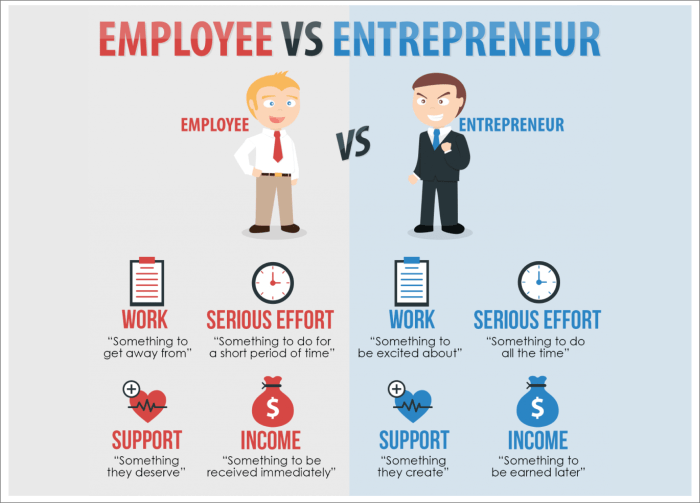The world of entrepreneurship and small business is a dynamic and ever-evolving landscape, presenting both challenges and opportunities for aspiring business owners. This comprehensive guide, “Entrepreneurship and Small Business V.2 Answers,” provides a thorough examination of the key concepts, best practices, and strategies essential for navigating this complex terrain.
Delving into the intricacies of entrepreneurship, we explore the defining characteristics of successful entrepreneurs, the motivations that drive them, and the contributions they make to economic development. We also delve into the distinct features of small businesses, their role in the economy, and the unique challenges they face.
Overview of Entrepreneurship and Small Business
Entrepreneurship refers to the process of starting and operating a business, often involving innovation and risk-taking. It plays a crucial role in economic development by creating jobs, driving innovation, and fostering competition.
Successful entrepreneurs possess traits such as creativity, resilience, and a strong work ethic. They are also able to identify opportunities, manage risks, and adapt to changing market conditions.
Small businesses, defined as businesses with a limited number of employees and revenue, contribute significantly to the economy. They provide employment, stimulate local economies, and offer diverse goods and services.
Key Differences between Entrepreneurship and Small Business

While entrepreneurship and small business are often intertwined, they have distinct characteristics.
Goals and Motivations, Entrepreneurship and small business v.2 answers
- Entrepreneurs prioritize innovation, growth, and impact.
- Small business owners focus on stability, profitability, and customer satisfaction.
Risk Tolerance and Innovation
- Entrepreneurs are typically more risk-tolerant and willing to invest in new ventures.
- Small business owners tend to be more risk-averse and focus on proven business models.
Business Structures, Legal Requirements, and Funding Options
- Entrepreneurs often operate as sole proprietorships or partnerships, while small businesses may adopt various structures (e.g., LLC, corporation).
- Legal requirements vary depending on the business structure.
- Entrepreneurs may seek venture capital or angel investment, while small businesses typically rely on loans or personal savings.
Challenges and Opportunities for Entrepreneurs and Small Businesses

Entrepreneurs and small business owners face numerous challenges.
Common Challenges
- Limited access to capital
- Competition from larger businesses
- Regulatory compliance
Despite these challenges, entrepreneurs and small businesses also encounter opportunities.
Potential Opportunities
- Technological advancements
- Government support
- Niche markets
The Role of Technology in Entrepreneurship and Small Business

Technology has revolutionized the way entrepreneurs and small businesses operate.
Advantages
- Increased efficiency and productivity
- Improved customer engagement
- Access to global markets
Disadvantages
- Cost of implementation and maintenance
- Cybersecurity risks
- Potential job displacement
Innovative Technologies
- Cloud computing
- Artificial intelligence
- E-commerce platforms
Best Practices for Success in Entrepreneurship and Small Business

To achieve success, entrepreneurs and small business owners should adopt certain best practices.
Market Research
Conduct thorough market research to identify customer needs, competition, and market trends.
Customer Service
Provide exceptional customer service to build loyalty and positive word-of-mouth.
Financial Management
Manage finances effectively, including budgeting, forecasting, and tracking expenses.
The Future of Entrepreneurship and Small Business
The future of entrepreneurship and small business is shaped by emerging trends and challenges.
Future Trends
- Increased use of technology
- Globalization of markets
- Changing consumer preferences
Challenges
- Competition from large corporations
- Regulatory uncertainty
- Economic downturns
Opportunities and Strategies
- Embrace technology to gain competitive advantage
- Target niche markets
- Partner with other businesses
FAQ Guide: Entrepreneurship And Small Business V.2 Answers
What are the key differences between entrepreneurship and small business ownership?
Entrepreneurs are driven by innovation and risk-taking, while small business owners prioritize stability and profitability. Entrepreneurs often establish new ventures, while small business owners may operate existing businesses.
What are some common challenges faced by entrepreneurs and small businesses?
Both entrepreneurs and small businesses face challenges such as securing funding, attracting customers, and navigating regulatory compliance. Entrepreneurs may also encounter higher levels of risk and uncertainty.
How can technology benefit entrepreneurs and small businesses?
Technology offers numerous benefits, including improved communication, increased efficiency, and access to new markets. It can also facilitate innovation and streamline operations.